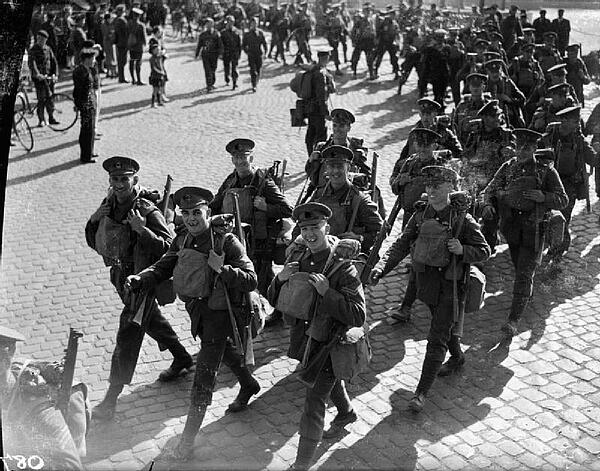The British Declaration of War
Prime Minister Neville Chamberlain's policy of appeasement had led to many believing that there would be no war at all, but it became clear in 1939 that Adolf Hilter had no intention of honouring the 'scrap of paper' he had signed with Britain's leader. As tensions grew between Hitler and the countries he threatened to invade, Chamberlain made a promise to protect them and stand against the Fuhrer, and on 1 September 1939, as German troops invaded Poland, Chamberlain was forced to defend them alongside France.
Both countries initially issues ultimatums to the country, demanding that Germant withdraw or face the might of the British and French military. However, these warnings were ignored and Hilter continued to infiltrate Polish towns. As a result, Britain therefore declared war against Nazi Germany at 11.15 on 3 September 1939, with Prime Minister Neville Chamberlain delivering a speech to the nation by radio to inform them of his decision.

The Speech Summarised:
Chamberlain stated in his speech that it was a "bitter blow" that his fight for peace had failed, but it was clear that Hitler had always had every intention of invading Poland. Although Hitler claimed he had put "reasonable" proposals to the Polish, this was claimed by Chamberlain to be a lie.
The Prime Minister stated that it was important that Britain and France went to the aid of Poland, who had already worked hard to "bravely" defend itself against the attack, to ensure they met their obligations and had a "clear conscience".
There had been, according to Chamberlain, a planning process taking place for many weeks, but it was time for the British people to get involved to defeat the Fuhrer. As such, whatever their role in the war effort, it was time for the Britons to report for duty in accordance with any instructions they had received and to do their jobs in an effort to secure peace.
Chamberlain finished by blessing the British people, stating that right would prevail against the brute force, bad faith, injustice, oppression and persecution of the Nazis.
The Speech in Full:
"I am speaking to you from the Cabinet Room at 10, Downing Street.
This morning the British Ambassador in Berlin handed the German Government a final note stating that unless we heard from them by 11.00 a.m. that they were prepared at once to withdraw their troops from Poland, a state of war would exist between us.
I have to tell you that no such undertaking has been received, and that consequently this country is at war with Germany.
You can imagine what a bitter blow it is to me that all my long struggle to win peace has failed. Yet I cannot believe that there is anything more or anything different I could have done and that would have been more successful.
Up to the very last it would have been quite possible to have arranged a peaceful and honourable settlement between Germany and Poland, but Hitler would not have it.
He had evidently made up his mind to attack Poland whatever happened; and although he now says he has put forward reasonable proposals which were rejected by the Poles, that is not a true statement.
The proposals were never shown to the Poles nor to us; and although they were announced in a German broadcast on Thursday night, Hitler did not wait to make comment on them, but ordered his troops to cross the Polish frontier.
His actions show convincingly that there is no chance of expecting that this man will ever give up his practice of using force to gain his will. He can only be stopped by force.
We and France are today, in fulfilment of our obligations, going to the aid of Poland, who is so bravely resisting this wicked and unprovoked attack on her people. We have a clear conscience. We have done all that any country could do to establish peace. The situation in which no word given to Germany’s ruler could be trusted and no people or country could feel themselves safe has become intolerable.
And now that we have resolved to finish it, I know that you will play your part with calmness and courage.
At such a moment as this the assurances of support that we have received from the Empire are a source of profound encouragement to us.
When I have finished speaking certain detailed announcements will be made on behalf of the Government. Give these your closest attention.
The Government have made plans under which it will be possible to carry on the work of the nation in the days of stress and strain that may be ahead. But these plans need your help.
You may be taking part in the fighting Services or as a volunteer in one of the branches of civil defence. If so you will report for duty in accordance with the instructions you have received.
You may be engaged in work essential to the prosecution of war for the maintenance of the life of the people – in factories, in transport, in public utility concerns or in the supply of other necessaries of life. If so, it is of vital importance that you should carry on with your jobs.
Now may God bless you all. May He defend the right. It is the evil things that we shall be fighting against – brute force, bad faith, injustice, oppression and persecution – and against them I am certain that the right will prevail."
MLA Citation/Reference
"The British Declaration of War". HistoryLearning.com. 2026. Web.
